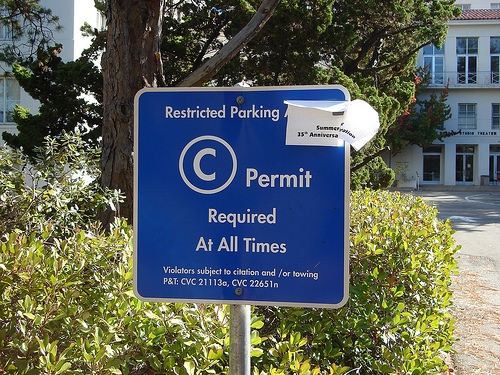UC Berkeley’s new class notes policy is the equivalent of fighting a kitchen fire with a sledgehammer. Not only is it a disproportionate response, it is an ineffective one as well – one that poses a subtler but greater threat than the fire itself. Berkeley’s policy is not well-supported by federal or state law, and represents a surprising step backwards for the University of California’s flagship campus.

(Image by Mike Linksvayer)
The policy states that “[i]ndividual instructors retain copyrights to lectures and class presentations, class materials they create, and related material pursuant to U.S. copyright law, California Civil Code § 980 (a)(1), and the University of California’s Policy on Copyright Ownership.” This language invokes three separate wellsprings of authority – federal, state, and institutional. A brief look at each in turn:
Section 102 of the federal Copyright Act informs us that copyright protect subsists, in general, “in original works of authorship fixed in any tangible medium of expression . . . .” The key term for our purposes is “fixed,” which pushes many, if not most, typical classroom lectures out from under the copyright umbrella. Extemporaneous presentations, unless recorded in some manner, do not get copyright protection.
California Civil Code §980 does grant ownership rights on unfixed presentations: “[t]he author of any original work of authorship that is not fixed in any tangible medium of expression has an exclusive ownership in the representation or expression thereof . . . .” Although the federal Copyright Act, in section 301, explicitly preempts state laws that provide similar rights, §980 avoids such preemption by dealing with works explicitly unprotected by federal copyright. It does look like a good foundation for the Berkeley policy, but the U.S. District Court for the Central District of California has found that §980 reflects a legislative intent “to deny copyright protection to ideas, as opposed to the manner in which they are expressed or represented.” (See page 1423 of the opinion) This preserves the core idea-expression dichotomy that prevents copyright law from protecting ideas and facts, rather than a specific expression of them. In essence, we can say that §980 effectively extends federal copyright-type protection, within the state of California, to unfixed works of authorship, but with limitations on subject matter analogous to those created by §102 of the Copyright Act.
Finally, the University of California’s copyright policy is more a policy statement than a grant of unique institutional rights. It states, in part: “The University encourages the creation of original works of authorship and the free expression and exchange of ideas.” Reasonable minds may disagree on whether copyright protection promotes or stifles the creation of original works, but Berkeley’s policy is an incontrovertible shackle upon students’ ability to engage in any exchange of ideas based upon those works.
How might a judge apply these laws? Faulkner Press v. Class Notes, a federal case in the Northern District of Florida, in which the defendant (a notes reseller) sold note packages including a significant amount of material copyrighted by Professor Michael Moulton. This material was prepared and recorded beforehand, and properly the subject of federal copyright protection. Judge Mickle informs us that fair use is a potential stumbling block for the sort of broad prohibitions embodied by Berkeley’s policy:
Even though the film study questions and practice questions are protected by copyright, genuine issues of fact remain as to whether inclusion of the questions, as well as the lecture summaries, within Class Notes’ note packages constitutes fair use…. Dr. Moulton’s works as a whole are derivative, factual, and published. Furthermore, his film study questions and practice questions are factual compilations. Copyright protection extends only to the selection and arrangement, not to the underlying facts themselves, and “[t]his inevitably means that the copyright in a factual compilation is thin.” Feist. 499 U.S. at 349. So in determining fair use, this factor will weigh against Faulkner Press.
With respect to California state law, some proponents of expanded professorial control over academic presentations find support in the ruling of the California Supreme Court in Williams v. Weisser, a 1969 case in which the court ruled in favor of a plaintiff professor against a note reseller defendant. Two points tend to weaken that support: first, the case predates the Copyright Act of 1976, which expressly preempts state laws that grant analogous rights and remedies. Second, the Court in Williams did not rely upon the protection of unfixed works granted by §980:
This is, therefore, not a case where the concrete expression of the “composition” (Civ. Code, § 980, subd. (a)) consists solely of an intangible oral presentation. (Nimmer on Copyright § 11.1.) As far as this litigation is concerned, the chief importance of the oral presentation is that it provided defendant with access to plaintiff’s work and with an argument that there had been a divestive publication.
Taken together, these two points mean that the common-law copyright jurisprudence applied in this case, in favor of the plaintiff, would today be preempted by federal statute.
A good look at the statutes and their application by judges should be enough to demonstrate that, if they try to exercise the “rights” granted by the Berkeley policy in a court of law, professors shouldn’t rely on an easy victory.
In the next installment: a discussion of the public policy issues that underlie the Berkeley notes policy, and how a licensing-and-permissions-based policy is more in line with the interests of educators and students than a rights-and-restrictions-based one. Also – to what extent do students and professors actually care what school policies say, and how should that inform the content of such policies?

